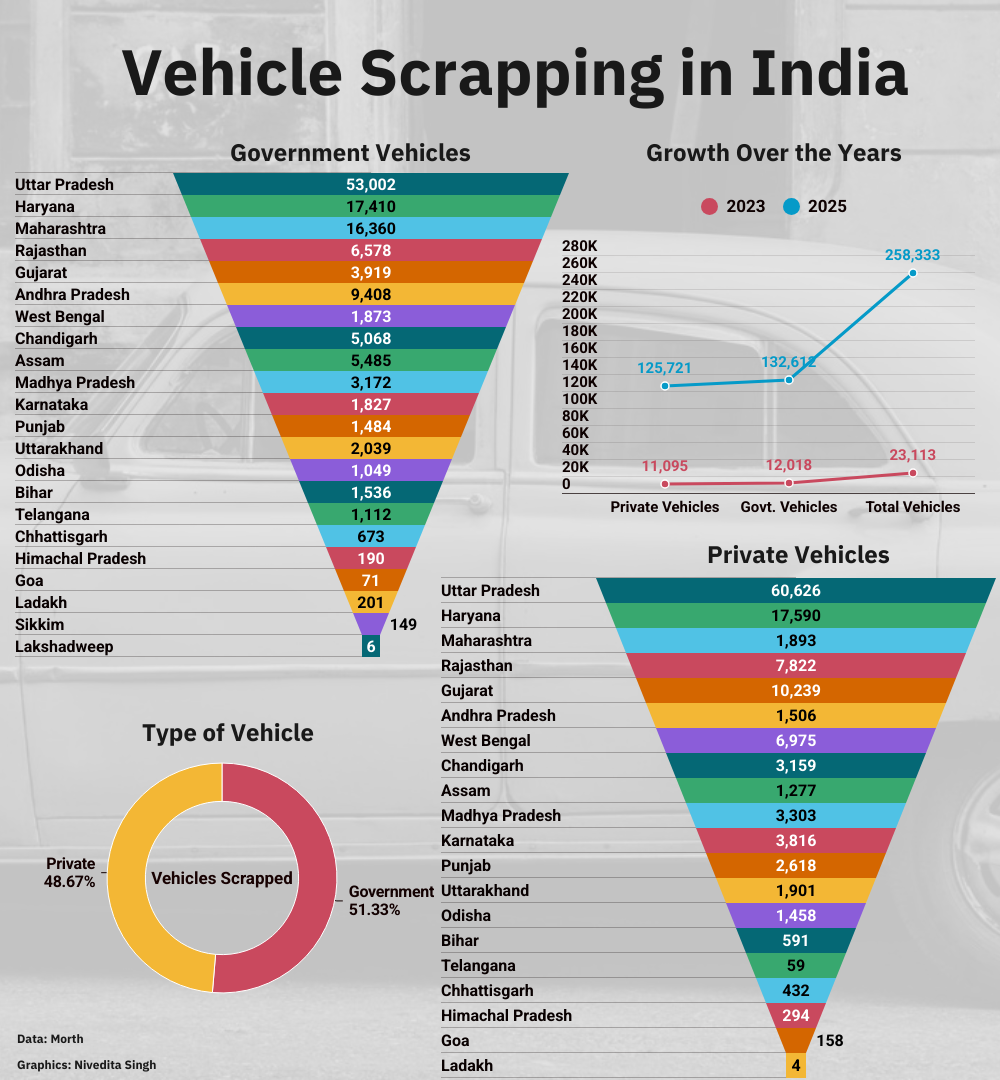Our Terms & Conditions | Our Privacy Policy
From 23,000 To 2.58 Lakh In 2 Years: India Races Ahead In Scrapping Of Vehicles, UP Leads With 45% | India News
Last Updated:July 28, 2025, 07:30 IST
Till July 2023, 11,095 private vehicles and 12,018 government vehicles were scrapped across 12 states. Currently, both categories have seen an 11-fold jump
At least 1,25,721 private vehicles and 1,32,612 government vehicles scrapped at 106 RVSFs in 21 States/UTs till July 2025. (Representative File/NSWS)
India has managed to scrap a total of 2.58 lakh old vehicles as of July 2025, up from just 23,113 vehicles scrapped till July 2023, an analysis of official data shows. Scrapping of both private and government vehicles has scaled at nearly the same pace, with government scrapping contributing a higher share.
Till July 2023, 11,095 private vehicles and 12,018 government vehicles were scrapped in 31 Registered Vehicle Scrapping Facilities (RVSFs) operational across 12 states.
Currently, both categories have seen an 11-fold jump, with 1,25,721 private vehicles and 1,32,612 government vehicles scrapped at 106 RVSFs in 21 States/UTs till July 2025.
The scrapping policy was announced in 2021 with the aim of creating an ecosystem to phase out unfit and polluting vehicles, which harm the environment 10 to 12 times more than fit vehicles and also pose a risk to road safety, according to the Ministry of Road Transport & Highways.
The policy aims to address concerns over vehicular pollution caused by old vehicles and envisages voluntary scrapping of unfit commercial and personal vehicles strictly based on their fitness, irrespective of vehicle age, the Ministry explained. “The implementation of the vehicle scrapping policy comes under the purview of respective State Governments,” MoRTH added.
Uttar Pradesh leading
Uttar Pradesh has emerged as the leader in vehicle scrapping in India, accounting for nearly 45% of all vehicles scrapped across the country, according to government data.
The state is home to 32 of the 106 operational RVSFs. It has contributed over 48% of all private vehicles scrapped nationwide, while its share of government vehicle scrappage stands around 40%, as shown in the graphs.
Of the total 2.58 lakh scrapped vehicles across India, 1.13 lakh were from Uttar Pradesh alone — 53,002 government vehicles and 60,626 private.
Each RVSF in Uttar Pradesh has scrapped about 3,550 vehicles on average, the analysis shows.
The numbers from Uttar Pradesh appear even more impressive when compared to Haryana, which has 17 RVSFs — the second highest in India — but has scrapped only 35,000 vehicles. Each RVSF there averages 2,050 vehicles scrapped. Uttar Pradesh has scrapped a little over three times more vehicles than Haryana.

Uttar Pradesh and Haryana were the only two states with more than 10 RVSFs. In terms of RVSF efficiency, Rajasthan has performed better. With just three facilities across the state, about 14,400 vehicles have been scrapped — nearly 5,000 per RVSF.
RVSFs in Rajasthan have scrapped 7,822 private vehicles and 6,578 government vehicles. The state offers motor vehicle tax concessions on new vehicles purchased against the ‘Certificate of Deposit’ of a scrapped vehicle.
Only six states scrapped over 10,000 vehicles
After Uttar Pradesh and Haryana, Maharashtra ranks third in total vehicle scrapping (18,253).
Only six states have managed to scrap more than 10,000 vehicles, including Rajasthan (14,400); Gujarat (14,158); and Andhra Pradesh (10,914).
Uttar Pradesh, Gujarat, and Rajasthan saw more scrappage of private vehicles. In contrast, Maharashtra and Andhra Pradesh scrapped more government vehicles.
Haryana had almost equal numbers from both sides, with private contributions slightly higher — just 180 more vehicles.

Govt outpacing private scrappage in Maharashtra, Andhra Pradesh
The numbers seen by News18 also show that Maharashtra and Andhra Pradesh are among the top states where government scrappage far outpaces private scrappage.
In Maharashtra, a total of 16,360 government vehicles have been scrapped against 1,893 private vehicles. In Andhra Pradesh, 1,506 private vehicles were scrapped against 9,408 government vehicles.
In Telangana, government scrappage is almost 19 times that of private. A total of 1,112 government vehicles were scrapped there against 59 private ones.
Over 70% scrappage in West Bengal, Gujarat from private sector
With almost 80% share, West Bengal has the biggest contribution from the private sector — 6,975 vehicles against 1,873 government vehicles. Of the total 8,848 vehicles scrapped in the state, about 20% were government.
In Gujarat, this share is higher in terms of absolute numbers. Of the total 14,158 vehicles scrapped, only 3,919 were government, while 10,239 (73%) were private.
As more unfit vehicles go off the roads, officials say the scrapping policy is beginning to deliver its twin promise — reducing pollution and enhancing road safety across Indian cities.
 Nivedita Singh
Nivedita Singh
Nivedita Singh is a data journalist and covers the Election Commission, Indian Railways and Ministry of Road Transport and Highways. She has nearly seven years of experience in the news media. She tweets @nived…Read More
Nivedita Singh is a data journalist and covers the Election Commission, Indian Railways and Ministry of Road Transport and Highways. She has nearly seven years of experience in the news media. She tweets @nived… Read More
view comments
- First Published:
News india From 23,000 To 2.58 Lakh In 2 Years: India Races Ahead In Scrapping Of Vehicles, UP Leads With 45%Disclaimer: Comments reflect users’ views, not News18’s. Please keep discussions respectful and constructive. Abusive, defamatory, or illegal comments will be removed. News18 may disable any comment at its discretion. By posting, you agree to our Terms of Use and Privacy Policy.
Images are for reference only.Images and contents gathered automatic from google or 3rd party sources.All rights on the images and contents are with their legal original owners.



Comments are closed.